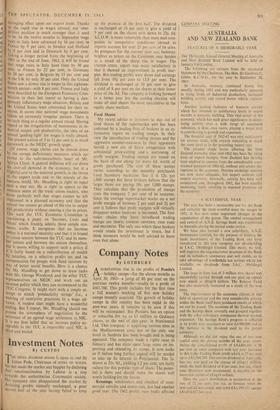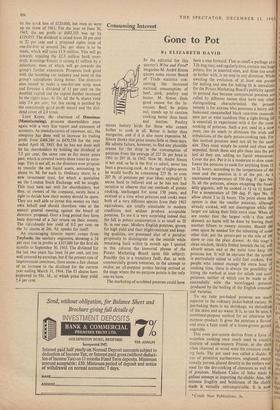Company Notes
By LOTHBURY
ASUBSTANTIAL rise in the profits of Pontin's —holiday camps—for the eleven months to April 30, 1963—a jump of 80 per cent on the previous twelve months—results in a profit of £661,760. This profit includes for the first time a full season's working of five new holiday camps recently acquired. The growth of holiday camps in this country has been rapid in the post-war years. It remains to be seen if this will be maintained. But Pontin's has an option to subscribe for up to £1 million in Ordinary shares, to the end of this year, in Pontinental Ltd. This company is acquiring various sites in the Mediterranean area, but so far only one hotel in Sardinia has been bought and is being operated. The company made a rights issue in January and has since spent large sums on im- proving and extending its camps. It now looks as if before long further capital will be needed to take up its interest in Pontinental. The 2s. shares at 21s. 9d., yielding 3.2 per cent, are fairly valued for this popular type of share. The poten- tial is there and should make the shares well worth holding for the future.
Kennings, wholesalers and retailers of com- mercial vehicles and motor-cars, has had another good year. The 1962 profits w ere badly affected by the stock loss of £120,000, but even so were up on those of 1961. For the year to June 30, 1963, the net profit at £682,335 was up by £129,855. The dividend is raised from 20 per cent to 22 per cent and a proposed rights issue of one-for-five at around 24s. per share is to be made, which will raise £1.9 million. This will go towards repaying the £2.3 million bank over- draft. Kennings Estates is raising £1 million by a - debenture, most of which will go towards the group's further expansion. Prospects look good with the booming car industry and most of the group's subsidiaries doing better. The directors also intend to make a one-for-one scrip issue and forecast a dividend of 11 per cent on the doubled capital and the capital further increased by the rights issue. At 33s. 6d. the 5s. shares yield only 3.4 per cent, but this rating is justified by the consistently good profit record and the divi- dend cover of 2.4 times.
Lord Keyes, the chairman of Dannimac (Manufacturing), presents shareholders once again with a very fine report and statement of accounts. As manufacturers of rainwear, etc., the company has done well to increase its trading profit from £466,280 to £470,556 for the year ended April 10, 1963. But he has not done well by his shareholders by holding the dividend at 7.5 per cent, the same rate as for many years past, which is covered twenty-three times by earn- ings. This is not all, as the directors now propose to transfer the net liquid assets, amounting to about 6s. 9d. for each Is. Ordinary share, to a new investment trust, for which a quotation on the London Stock Exchange will be sought. This may turn out well for shareholders, but they, as owners of the company, surely have a right to decide how their money should be spent. They are well able to invest this money on their own behalf and should therefore vote at the annual general meeting against the board of directors' proposal. Over a long period they have been deprived of a fair return on their money. The ridiculously low yield of 0.3 per Tent on the Is. shares at 20s. 9d. speaks for itself.
An encouraging interim report comes from Twyfords, the sanitary engineers, showing a 54 per cent rise in profits at £307,000 for the first six months to September 30, 1963. The dividend for the last two years has been 14 per cent, not too well covered by earnings, but if the present rate of improvement continues, there seems a fair chance of an increase in the dividend for the current year ending March 31, 1964. The £1 shares have improved to 51s. 3d., at which price they yield 5.4 per cent.







































 Previous page
Previous page